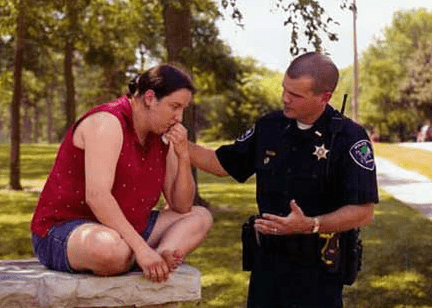Last month I participated in a Crisis Intervention Training (CIT) with local law enforcement. These officers, dispatchers, and prison guards were learning how to improve their interactions with people who have mental illness.
It is a week-long training put on by our region’s mental health center. Counselors talk with participants about mental illness and a troupe of actors even come in to role play. Different situations are presented by the actors and the CIT participants have to interact with them.
My job was to sit on a panel on the last day of the training and tell the story of my mental illness and what it’s like living with it every day. Three of my peers did the same.
Some of the topics we covered were: experiences we’ve had with stigma, how much time we spend maintaining our mental health, what has helped in our recovery, any barriers or challenges in recovery, and what it was like when we were first diagnosed.
Two other important bits of information we shared were to tell officers what we are like when we are well, and what we are like when we are not well.
For me, it’s like being two different people. The “well” me is productive, kind, respectful, a good mother, a good friend and someone pleasant to be around. The “unwell” me is depressed, can’t leave the house, and suicidal. The mania side is destructive, dangerous, and irrational.
I also shared with the participants that when I get manic I have an obsession with the police. That was hard to admit, but I wanted to give them a real picture.
My goal during my last manic episode was to get arrested. Thank God I didn’t follow through on any of the thoughts going through my head. After the episode my doctor asked me why I wanted to get arrested. I said I had no idea. She suggested that maybe because I felt so out of control, I wanted someone to take control. As I told the CIT participants this, many of the police officers were shaking their head ‘yes’. I think they understood that.
I also shared some actual interactions with law enforcement in the past 9 years that I’ve been diagnosed with a mental illness.
About eight years ago, an officer was called to my house because I was threatening suicide. He drove me to the emergency room for evaluation.
The second interaction was because I was speeding and not well at all. The state patrolman pulled me over and saw immediately that I was in distress. I was crying and upset. He asked me to come sit in his patrol car and talk. He put me in the back and asked me if I thought I needed to go to the hospital. I said no, so then he asked if he could call someone for me because he didn’t think I was safe to drive. The officer sat there with me on the side of the highway until my husband could come get me. I’m not sure if he had CIT or not, but he said all the right things and really listened to me. It was a situation that could have turned out a lot worse but it didn’t.
After the panel was finished with our stories I expected to walk out of the room quietly. Instead, we were instantly surrounded by the participants who hugged us and thanked us and told us how brave we were to share our stories.
They thanked us, but we made sure to thank them too. Because, all the training they just went through may just save our lives someday.


